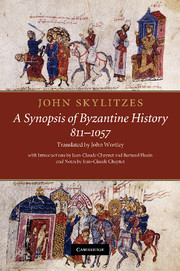Book contents
- Frontmatter
- Contents
- The English translator’s Preface
- Introduction
- Re-writing history: John Skylitzes’ Synopsis historion
- Foreword
- Chapter 1 Michael I Rangabe, the Kouropalates [811–813]
- Chapter 2 Leo V the Armenian [813–820]
- Chapter 3 Michael II the Stammerer [820–829]
- Chapter 4 Theophilos [829–842]
- Chapter 5 Michael III, the son of Theophilos [842–867], and his mother Theodora [842–862]
- Chapter 6 Basil I Kephalas, the Macedonian [867–886]
- Chapter 7 Leo VI the Philosopher (the Wise) [886–912]
- Chapter 8 Alexander [912–913]
- Chapter 9 Constantine VII, Porphyrogennetos [913–959]
- Chapter 10 Romanos I Lekapenos [919–944]
- Chapter 11 Constantine VII [944–959]
- Chapter 12 Romanos II the Younger [959–963]
- Chapter 13 Basil II Bulgaroktonos and Constantine VIII [976–1025]
- Chapter 14 Nikephoros II Phokas [963–969]
- Chapter 15 John I Tzimiskes [969–976]
- Chapter 16 Basil II and Constantine VIII bis [976–1025]
- Chapter 17 Constantine VIII [1025–1028]
- Chapter 18 Romanos III Argyros [1028–1034]
- Chapter 19 Michael IV the Paphlagonian [1034–1041]
- Chapter 20 Michael V Kalaphates [1041–1042]
- Chapter 21 Constantine IX Monomachos [1042–1055]
- Chapter 22 Theodora [1055–1056]
- Chapter 23 Michael VI the Elder/Stratiotikos [1056–1057]
- Glossary
- Bibliography
- Index
- References
Chapter 21 - Constantine IX Monomachos [1042–1055]
Published online by Cambridge University Press: 05 July 2014
- Frontmatter
- Contents
- The English translator’s Preface
- Introduction
- Re-writing history: John Skylitzes’ Synopsis historion
- Foreword
- Chapter 1 Michael I Rangabe, the Kouropalates [811–813]
- Chapter 2 Leo V the Armenian [813–820]
- Chapter 3 Michael II the Stammerer [820–829]
- Chapter 4 Theophilos [829–842]
- Chapter 5 Michael III, the son of Theophilos [842–867], and his mother Theodora [842–862]
- Chapter 6 Basil I Kephalas, the Macedonian [867–886]
- Chapter 7 Leo VI the Philosopher (the Wise) [886–912]
- Chapter 8 Alexander [912–913]
- Chapter 9 Constantine VII, Porphyrogennetos [913–959]
- Chapter 10 Romanos I Lekapenos [919–944]
- Chapter 11 Constantine VII [944–959]
- Chapter 12 Romanos II the Younger [959–963]
- Chapter 13 Basil II Bulgaroktonos and Constantine VIII [976–1025]
- Chapter 14 Nikephoros II Phokas [963–969]
- Chapter 15 John I Tzimiskes [969–976]
- Chapter 16 Basil II and Constantine VIII bis [976–1025]
- Chapter 17 Constantine VIII [1025–1028]
- Chapter 18 Romanos III Argyros [1028–1034]
- Chapter 19 Michael IV the Paphlagonian [1034–1041]
- Chapter 20 Michael V Kalaphates [1041–1042]
- Chapter 21 Constantine IX Monomachos [1042–1055]
- Chapter 22 Theodora [1055–1056]
- Chapter 23 Michael VI the Elder/Stratiotikos [1056–1057]
- Glossary
- Bibliography
- Index
- References
Summary
The wheel of fortune having decreed that Zoe should once again rule the empire, she reluctantly allowed her own sister, Theodora, to reign with her, as we said. The Senate was rewarded with promotions to honours, the people with the distribution of gifts. The administration found itself conducted with befitting foresight; letters and directives were sent out in all directions promising that offices would not be for sale and could no longer be purchased the way they used to be; also stipulating that any wrongdoing was to be cast out from among them. When these regulations had come into effect to the rulers’ satisfaction, the nobelissimos Constantine was recalled from exile and questioned concerning public monies. Terrified by what he was threatened with, he showed the fifty-three kentenaria of gold hidden in a cistern at his house near Holy Apostles’ church. The sum was delivered to the empress while he returned into exile. She appointed her father’s eunuch, Nicholas the proedros, domestic of the scholai for the east; the patrician Constantine Kabasilas duke of the west. She sent off George Maniakes, already released from prison by Michael, to be commander plenipotentiary of the army units in Italy with the rank of magister. This is how it went; then a conference was held concerning the [office of] emperor and the unanimous opinion was that an emperor ought to be appointed and married to Zoe. Her inclination was to marry the katepan Constantine Artoklines, so called from the position in which he had served. He was a man of pleasing appearance, said to have been Zoe’s secret lover, [423] but his wife expelled him from this life with poison, not because she did not love him any more, but because she was about to be deprived of him even while he was alive. Anyway, the empress, frustrated in her plan, recalled Constantine Monomachos from exile.
- Type
- Chapter
- Information
- John Skylitzes: A Synopsis of Byzantine History, 811–1057Translation and Notes, pp. 397 - 446Publisher: Cambridge University PressPrint publication year: 2010

